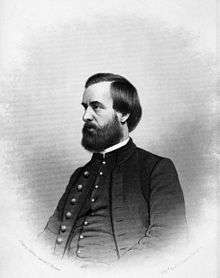Arthur Buckminster Fuller
Arthur Buckminster Fuller (August 10, 1822 – December 11, 1862) was a Unitarian clergyman of the United States.
Arthur Buckminster Fuller | |
|---|---|
 | |
| Signature | |
Biography
Fuller was born in Cambridgeport, Massachusettson August 10, 1822. He was a son of United States Congressman Timothy Fuller, and was prepared for college by his sister Margaret Fuller. He graduated from Harvard College in 1843, and studied in the Harvard Divinity School. For some years, he was a teacher and missionary in Illinois, after which he held pastorates in Manchester, New Hampshire (1848–1853), Boston (new North Church; 1853–1859) and Watertown, Massachusetts (until 1861).
In the American Civil War, he became chaplain to the Sixteenth Massachusetts Volunteer Infantry on August 1, 1861. He was honorably discharged on December 10, 1862, on account of failing health. On the day following his discharge, being present at the Battle of Fredericksburg, he volunteered to join the Nineteenth Massachusetts in crossing the Rappahannock River, and was shot to death while attempting to drive the Confederate sharpshooters out of the city.
Inventor Buckminster Fuller was a grandson of his.[1]
Writings
He edited several works of his sister Margaret. Among his other publications are:
- Sabbath-School Manual of Christian Doctrine and Institutions (Boston, 1850)
- Historical Discourse delivered in the New North Church, Boston, 1 October 1854
- Liberty versus Romanism, two discourses (1859)
Notes
- Herring, Joseph. "Arthur Buckminster Fuller". Dictionary of Unitarian & Universalist Biography. Archived from the original on 19 October 2006. Retrieved 27 April 2012.
References
- This article incorporates text from a publication now in the public domain: Wilson, J. G.; Fiske, J., eds. (1900). . Appletons' Cyclopædia of American Biography. New York: D. Appleton.
- This article incorporates text from a publication now in the public domain: Rines, George Edwin, ed. (1920). . Encyclopedia Americana. This work in turn cites:
- Fuller, R. F., Chaplain Fuller (Boston 1863)
- Higginson in Harvard Memorial Biographies, v. I, Cambridge, Massachusetts, 1866.
External links
- Works by Arthur Buckminster Fuller at Project Gutenberg
- Works by or about Arthur Buckminster Fuller at Internet Archive
- . New International Encyclopedia. 1906.
- Chaplain Fuller, Being a Life Sketch of a New England Clergyman and Army Chaplain (1864) by his brother Richard Frederick Fuller